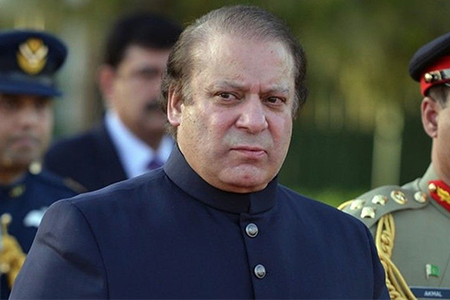Ironically, it was his party that objected to the amendment of a morality clause under which the Pakistan prime minister was disqualified.
 As news broke of Nawaz Sharif’s disqualification as Pakistan’s Prime Minister by the Supreme Court on July 28, the international press kicked into high gear to cover the story and make sense of what had happened.
As news broke of Nawaz Sharif’s disqualification as Pakistan’s Prime Minister by the Supreme Court on July 28, the international press kicked into high gear to cover the story and make sense of what had happened.
However, the over-arching narrative left a lot to be desired.
While some articles were perceptive, such as Omar Warraich’s piece in The Atlantic, much of the coverage had factual errors and presented simplistic arguments that ultimately painted Sharif as a fallen hero who had once again succumbed to the deep state’s (essentially the ISI and the army) machinations.
For instance, in an article headlined “Sharif’s Ouster is Bad News” in Bloomberg, Mihir Sharma said:
“When Sharif was elected, you could hope that, under him, Pakistan would grow closer to India and the west, crack down on terrorism, and reform its economy. You can no longer expect any of that. Instead, it’s far more likely Pakistan will turn to China to help shore up its patronage-based economy.”
Sharma, a columnist who mostly writes about India, is clearly a casual observer of his country’s nuclear neighbour. Pakistan watchers abandoned hopes of economic reform in the country very early on in Sharif’s most recent term that began in 2013 (he’s assumed the post twice before, from 1990-1993 and 1997-1999). As far as coming closer to India was concerned, Sharif quickly retracted from this policy goal after encountering resistance from the establishment and segments of his own ruling party.
And then there was the China embrace: the Pakistan Muslim League (Nawaz) has been the most vociferous supporter of the China-Pakistan Economic Corridor and it has been the Sharif government that has turned to China to shore up the country’s economy. In fact, senior Pakistan Muslim League (Nawaz) leaders have come on television and said that international actors (read: United States and India) were conspiring against Sharif because of his support for the China-Pakistan Economic Corridor, a part of China’s ambitious One Belt One Road project.
Then there’s Aqil Shah’s selective reading of Pakistani history in the New York Times, where he observes:
“In June 2012, the Supreme Court, led by Iftikhar Chaudhry, then the chief justice, convicted and disqualified Prime Minister Yousaf Raza Gilani of the Pakistan People’s Party for contempt after he refused to comply with a court order to reopen a dormant corruption inquiry against President Asif Ali Zardari...
The Pakistan Peoples Party led by Mr Gilani [had] formed a new civilian government in February 2008. Mr. Gilani was reluctant to restore Justice Chaudhry and other judges fired by General Musharraf [in 2007-’08] because his party feared Justice Chaudhry might restart corruption investigations against Mr Zardari. Protests by the opposition and an ultimatum from Gen Ashfaq Parvez Kayani, then head of the Army, forced him to reinstate Justice Chaudhry and other justices.
Justice Chaudhry mended fences with the military and promptly returned General Kayani’s favor by heeding his demand that the Supreme Court investigate allegations by a Pakistani-American businessman that Husain Haqqani, then Pakistan’s ambassador to the United States, had written a memo seeking American help in averting a military coup [after the US raid in Abbottabad that killed Osama bin Laden in 2011]. Justice Chaudhry’s court upheld the military’s view that the memo was authentic and accused Mr Haqqani of disloyalty to Pakistan.”
But Shah, an academic and author of The Army and Democracy: Military Politics in Pakistan, forgets to mention that when Gilani was found guilty, Sharif demanded his resignation and called for fresh elections. Instead of voicing concern over the way in which a sitting prime minister had been dismissed by the courts, the Pakistan Muslim League (Nawaz) and its leadership celebrated the historic decision. It was also Sharif’s party that had filed a reference in the Supreme Court and sought a probe into the Husain Haqqani’s activities as ambassador, which brought up the allegation over the memo seeking America’s help and Haqqani’s subsequent resignation in 2011 even as he denied the charge.
Then there are the factual mistakes publications made in a rush to get the story out to a global audience. Haris Khalique, writing for the New York Times, said: “Every democratically elected government has been removed on charges of corruption and incompetence.”
And the New York Times’ editorial on July 31 said: “Mr Sharif had been grooming his daughter, Maryam Nawaz Sharif, to succeed him, but the Supreme Court also disqualified her and two of her brothers from political office.”
Both statements are untrue. The year 2013 marked the first time any democratically elected government in Pakistan completed its full five-year term, which means that not every democratically elected government has met an unfortunate end. But it is true that no democratically elected prime minister has been allowed to complete his full five-year term.
Also, the Supreme Court of Pakistan has only disqualified Sharif from office, not his children. It has, however, directed the National Accountability Bureau to initiate corruption investigations against Sharif and his family, including Maryam Nawaz and her brothers Hussain and Hassan Nawaz.
So what really happened in Pakistan?
Originally published in Scroll.in
